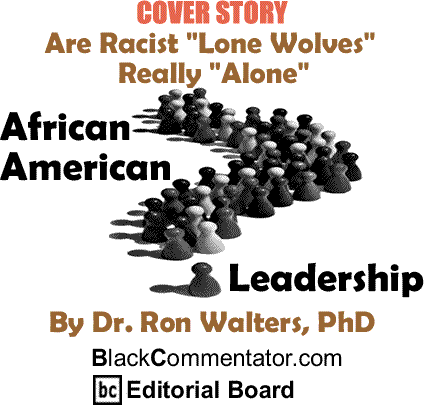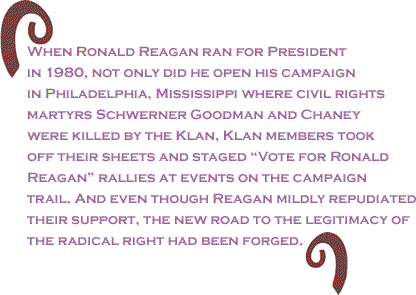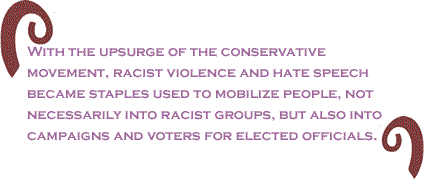
|
|||||||||||||||||||||||

|
|

Custom Search
|
|
 |
|
| On Wednesday evening June 10, I was supposed to have attended the preview of a play by Janet Cohen, an African American writer and wife of Jewish former Secretary of the Army, Steve Cohen at the Holocaust Museum, but that day it was attacked by James von Brunn, long time avowed white racist. At the entrance to the Museum von Brunn shot and killed Stephen Johns, a beloved African American security guard who had worked there for six years. This was a supreme irony because Janet’s play, Anne and Emmett was about introducing more Americans to the lives of Anne Frank and Emmett Till, two Jewish and African American icons of the human rights movement whose lives have been used to repudiate racist violence. Needless to say, the preview was cancelled and I awoke the next day to find the American media cutting the foundation of American racism out of the story by emphasizing that von Brunn was a “lone wolf.” But was he really? We make two points. So-called “lone wolves” are part of a larger official community which gives them substantial legitimacy and two, when that legitimacy falters they are most likely to show their violent fangs. With the upsurge of the conservative movement, racist violence and hate speech became staples used to mobilize people, not necessarily into racist groups, but also into campaigns and voters for elected officials. When Ronald Reagan ran for President in 1980, not only did he open his campaign in Philadelphia, Mississippi where civil rights martyrs Schwerner Goodman and Chaney were killed by the Klan, Klan members took off their sheets and staged “Vote for Ronald Reagan” rallies at events on the campaign trail. And even though Reagan mildly repudiated their support, the new road to the legitimacy of the radical right had been forged. In the 1990s, as one publication put it, “a feeling of rage is building across the country,” an expression of which became the militias that were forming in many states, ostensibly to protect citizens from all sorts of government conspiracies. Many of these had ties to racist, neo-Nazi and Ayran supremacy movements and most militia members were also card carrying members of the National Rifle Association which gave them political protection. So serious was this movement regarded that in return for grass roots assistance, some members of Congress included them in campaign operations and gave them access to government resources. In March of 1995, the paranoid rumor of a federal plan to raid them prompted inquiries to Attorney General Janet Reno’s office from mostly Republican members of Congress, such as: Robert Dornan (CA), Mac Collins (GA), James Hansen (UT), Larry Craig, (ID), Lauch Faircloth (NC), and Steve Stockman (TX). Next month on April 19, when “lone wolf” Timothy McVeigh bombed an Oklahoma City federal building, because he had ties to the Michigan Militia, members of Congress with ties to such groups, such as Rep. Helen Chenoweth (ID) who had associations with the Commander of the United Militia Assn. and others were pressured to explain the nature of these ties.
Bill Clinton tried to de-legitimize the hate-filled atmosphere with speeches addressing directly the need for stronger hate crimes legislation. Official statistics indicate that most such crimes are oriented toward race and most of these involve African Americans. But although the Clinton administration wanted to expand it to include crimes against gays and provision related to the burning of churches, in his last days in office, he publicly regretted the fact that Republicans had prevented the passage of any hate crimes legislation. Indeed,
Republicans made such moves extremely difficult. When in 1999, Democrat,
Rep. Robert Wexler (CA) attempted to pass a resolution condemning
the Council of Conservative Citizens, a new version of the supremacist
group, White Citizens Council, Republicans With the latest change of administrations it may appear that legitimacy for racism has weakened, and so the “lone wolves” may come out once more. BlackCommentator.com Editorial Board member Dr. Ron Walters is the Distinguished Leadership Scholar,
Director of the African American Leadership Center and Professor
of Government and Politics at the University of Maryland College
Park. His latest book is: The Price of Racial Reconciliation (The Politics of Race and Ethnicity)
|
|
Any BlackCommentator.com article may be re-printed so long as it is re-printed in its entirety and full credit given to the author and www.BlackCommentator.com. If the re-print is on the Internet we additionally request a link back to the original piece on our Website. Your comments are always welcome. eMail re-print notice
If you send us an eMail message we may publish all or part of it, unless you tell us it is not for publication. You may also request that we withhold your name. Thank you very much for your readership. |
|
| |
|
| June
18 , 2009 Issue 329 |
|
| Executive Editor: Bill Fletcher, Jr. |
| Managing Editor: Nancy Littlefield |
| Publisher: Peter Gamble |
| Est. April 5, 2002 |
Printer Friendly Version
in resizeable plain
text format or pdf
format. |
| Frequently Asked Questions |
 |

|
 |
 |
 |
| |
| |





































